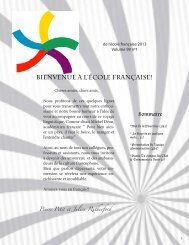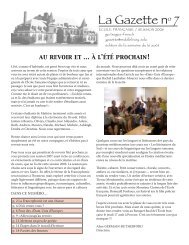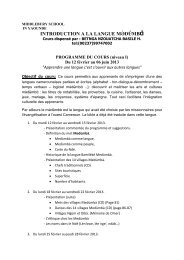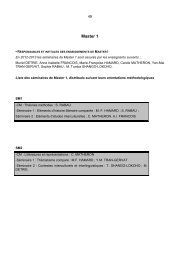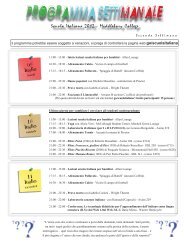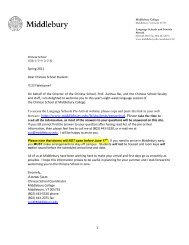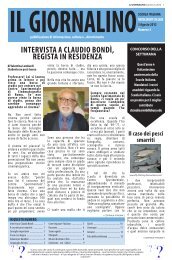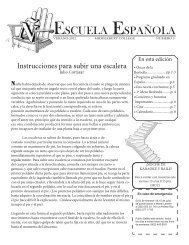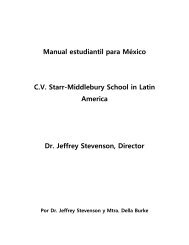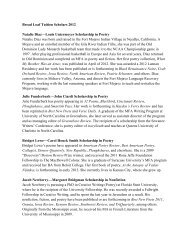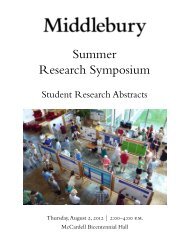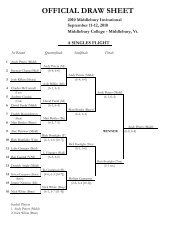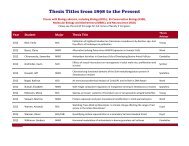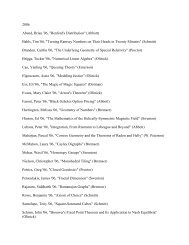2010 Catalog - Middlebury College
2010 Catalog - Middlebury College
2010 Catalog - Middlebury College
You also want an ePaper? Increase the reach of your titles
YUMPU automatically turns print PDFs into web optimized ePapers that Google loves.
Bread Loaf<br />
in Vermont<br />
Group I (Writing and the Teaching of Writing)<br />
7000b Poetry Writing/Mr. Huddle/T, Th 2–4:45<br />
In this course, we’ll attempt to be unusually productive. We’ll look<br />
for assignments that will lead us into composing drafts of poems, we’ll<br />
make contracts to write poems on specific topics and in specific forms,<br />
and we’ll read and discuss a great deal of poetry in class. As much as<br />
possible, we’ll attempt to save our detailed criticism for conferences and<br />
written exchanges. We’ll look for some unconventional methods of<br />
encouraging each other to make poems that matter.<br />
Texts: Marie Howe, What the Living Do: Poems (Norton); Tony<br />
Hoagland, Donkey Gospel: Poems (Graywolf); The Autumn House<br />
Anthology of Contemporary American Poetry, ed. Sue Ellen Thompson<br />
(Autumn House); Jack Gilbert, The Great Fires: Poems 1982–1992<br />
(Knopf); Steve Scafidi, For Love of Common Words (LSU); Dorianne<br />
Laux, Smoke (BOA) and Awake (Eastern Washington); Ted Kooser,<br />
Delights & Shadows (Copper Canyon); Amy Gerstler, Dearest Creature<br />
(Penguin Poets).<br />
7000c Poetry Writing/Mr. Muldoon/M, W 2–4:45<br />
A workshop devoted to close readings of poems by the participants,<br />
the course will be augmented by readings of, and formal assignments<br />
based on, a wide range of contemporary poets from Ashbery to Ali,<br />
Dickey to Dove, Larkin to Levertov, Olson to Oliver. Participants will<br />
be expected to have a firm grasp of poetic terms and of prosody and to<br />
be able and willing to discuss poetry with acumen and aplomb. Though<br />
the workshop will be at the heart of the course, two conferences will<br />
also be scheduled with each poet.<br />
Texts: The Norton Anthology of Contemporary Poetry, ed. Jahan Ramazani,<br />
Richard Ellmann, and Robert O’Clair; The New Princeton Handbook<br />
of Poetic Terms, ed. T.V.F. Brogan (Princeton); Derek Attridge, Poetic<br />
Rhythm: An Introduction (Cambridge).<br />
7005b Fiction Writing/Mr. Strong/M, W 2–4:45<br />
This workshop will provide a forum for reading aloud and constructively<br />
criticizing each other’s work with the goal of creating rounded<br />
life on the page in language natural to the writer. There will be<br />
deadlines, but the sole continuing assignment will be to write literary<br />
fiction: fragments, first drafts, false starts, longer works-in-progress,<br />
completed pieces—all will be acceptable and expected. We will read<br />
some essays on writing, but the focus, in class and conferences, will<br />
remain on the stories that only you can tell.<br />
Texts: A packet of readings will be available in Vermont.<br />
7005c Fiction Writing/Mr. Strong/T, Th 2–4:45<br />
See course description above.<br />
7018 Playwriting/Mr. Clubb/M, W 2–4:45<br />
This course concerns itself with the many ways we express ourselves<br />
through dramatic form. An initial consideration of the resources at<br />
hand will give way to regular discussions of established structures and<br />
techniques. Members of the class are asked to write a scene for each<br />
class meeting. Throughout the course we will be searching for new<br />
forms, new ways of ordering experience, new ways of putting our own<br />
imaginations in front of us.<br />
7103 Evolving Forms of Literacy: Writing and Digital Media/<br />
Ms. Goswami with Mr. Sax/M-F 11:15–12:15<br />
In this workshop we will reflect on the forms writing takes in digital<br />
environments and on the shifting relation of writing to image and<br />
page to screen. Working in production teams, class members will be<br />
introduced to an array of tools and techniques as they direct, shoot,<br />
edit, and screen a short documentary. A professional photographer and<br />
art museum educator will lead sessions on using images to approach<br />
various themes and prompt thinking about the world outside the<br />
classroom. Exhibits and open screenings of documentaries will be<br />
scheduled. Class members will be expected to contribute regularly to<br />
the class blog and to conduct their own inquiry into some aspect of the<br />
class theme. Readings will include the texts below as well as articles<br />
provided on the course Web site. Participants will be asked to commit<br />
additional hours to the course beyond the scheduled meeting time<br />
during the week of photography sessions and documentary production.<br />
No technology experience is required; video equipment will be<br />
provided by Bread Loaf.<br />
Texts: Robert Coles, Doing Documentary Work (Oxford); Teaching the<br />
New Writing: Technology, Change, and Assessment in the 21st-Century<br />
Classroom, ed. Anne Herrington, Kevin Hodgson, Charles Moran<br />
(Teachers <strong>College</strong>); Gunther Kress, Literacy in the New Media Age<br />
(Routledge); Jacqueline Jones Royster, Traces of a Stream: Literacy and<br />
Social Change among African American Women (Pittsburgh); Eudora Welty,<br />
One Writer’s Beginnings (Harvard).<br />
7107 Language across Difference/Mr. Paris/M, W 2–4:45<br />
A struggle for language rights was waged in U.S. schools and courts<br />
throughout the 1960s and 1970s. These decades were a moment in<br />
a long story about which languages (e.g., English or Spanish) and<br />
varieties of language (e.g., “standard” English or African American<br />
English) are legitimate, worth teaching and learning, and hold social<br />
and political power. This story of language rights is intimately tied to<br />
the story of racial, class, and gender inequality. We will examine this<br />
story both historically and in contemporary politics and schools, most<br />
notably the controversies surrounding African American English in<br />
schools and English-only policies. We will look at issues of language<br />
loss globally and in indigenous American communities to provide a<br />
context for language rights struggles. We will also spend significant<br />
time looking at how authors (from high school students to academics<br />
to Pulitzer Prize winners) have used writing to challenge the supremacy<br />
of “standard” English, traditional print literacy, and dominant genres of<br />
writing while simultaneously pushing for racial, class, and gender<br />
equality. Throughout the course, we will maintain a focus on how<br />
these issues inform our teaching and our own practices as writers and<br />
speakers. Assignments will include developing a classroom application<br />
to use in your teaching as well as an extended written piece exploring<br />
a course topic as it relates to your own identity. We will read from the<br />
following texts as well as articles available at Bread Loaf.<br />
Texts: David Crystal, Language Death (Cambridge); John Rickford and<br />
Russell Rickford, Spoken Soul (Wiley); Andrea Lunsford, The Everyday<br />
Writer, 4th ed. (Bedford/St. Martins); Gloria Anzaldúa, Borderlands/La<br />
Frontera (Aunt Lute); What They Don’t Learn in School: Literacy in the<br />
Lives of Urban Youth, ed. Jabari Mahiri (Peter Lang); Alison Bechdel,<br />
Fun Home (Mariner); Junot Diaz, Drown (Riverhead).<br />
25<br />
VERMONT



